
We’re increasingly realizing that animal-based protein mightn’t be the best for our health and certainly isn’t amazing for the planet. While chicken isn’t as controversial as red meat or heavily processed meat, many people are still turning away from it. But is plant-based chicken good for you (among other plant-based meats), or should you stick with the real stuff?
Plant-based chicken seems like a much healthier option. Such products are made from plant-based sources of protein, such as soy or wheat, and are shaped in familiar ways, giving you plant-based chicken nuggets, wings, and even roasts.
But is plant-based chicken good for you? This question is worth asking because food isn’t automatically healthy just because it’s made from plants. The nutritional profile still matters, as do the presence of any additives.
As you’ve probably guessed, there are some concerning features to talk about with plant-based chicken and plenty of good ones. Let’s see which of the two areas wins out.
Is Plant-Based Chicken Good For You?
Examples Of Plant-Based Chicken
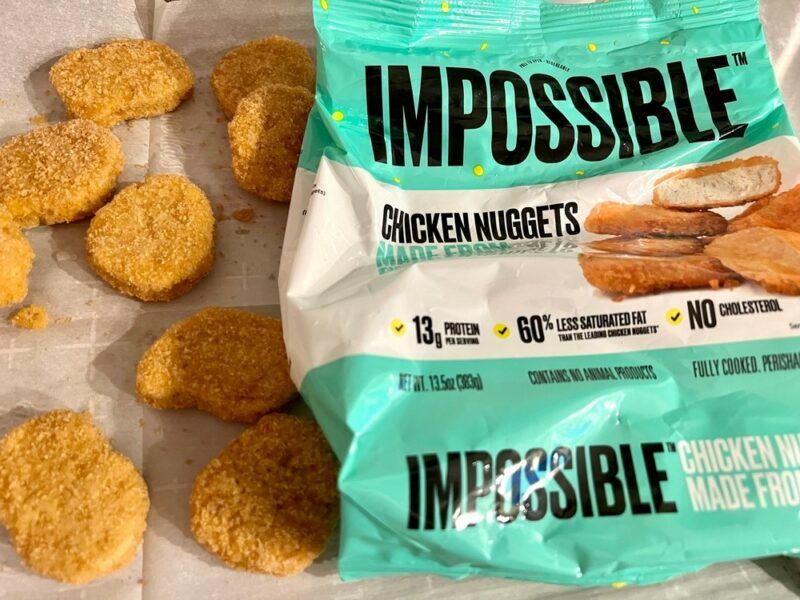
To begin, let’s look at some of the products in the market. There are quite a few differences between them, differences that influence their health effects.
Beyond Chicken Plant-Based Breaded Tenders
Beyond Meat produces many plant-based meat alternatives. They’re all famous for being surprisingly similar to real meat. Indeed, their Plant-Based Breaded Tenders do look almost exactly like actual chicken tenders.
For a serving of 2 tenders, you get 12 grams of fat, 2 grams saturated fat, 15 grams carbs, and 11 grams of protein. This isn’t too bad, given that chicken nuggets and tenders are often high in saturated fat.
Beyond’s version uses faba beans as the primary source of protein. However, the ingredients label is long and includes ingredients like natural flavors, dextrose, wheat gluten, sodium phosphates, and canola oil.
Tofurky Chick’n
Tofurky offers three versions of Plant-Based Chick’n. These all resemble chicken breast and just vary in their flavors (you can choose from Lightly Seasoned, Thai Basil, and Sesame Garlic).
The Lightly Seasoned version gives you 3 servings per package (roughly 1/3 of a cup each). A serving gives you 190 calories, 10 grams of fat, 1 gram of saturated fat, 9 grams of carbs, and 19 grams of protein.
This time, the main ingredients are vital wheat gluten and tofu. There are also natural flavors, canola oil, potassium chloride, xanthan gum, and various other additives.
Gardein Seven Grain Crispy Tenders
These tenders from Gardein get consistently good reviews for their flavor and texture. This time, a serving contains 150 calories and includes 7 grams of fat, 0.5 grams of saturated fat, 11 grams of carbs, and 10 grams of protein.
Wheat flour and soy protein isolate feature heavily on the ingredients list, along with a similar selection of additives to the other brands. Interestingly, oats are used as well.
Field Roast Buffalo Wings
The Buffalo Wings from Field Roast are unusual, as one of their main ingredients is Yukon gold potatoes. This gives them a pretty different nutritional profile than other products.
In particular, a serving of 7 wings contains 270 calories, 15 grams of fat, 1 gram of saturated fat, 23 grams of carbs, and 11 grams of protein. The calorie and fat content is on the high side, but you might not be eating 7 of the wings at a time.
These wings use additives as well, including fructose, dextrin, natural flavors, modified potato starch, and more.
What About Shredded Chicken?
I really wanted to find some plant based shredded chicken to make vegan tacos, but couldn’t find any brands doing chicken like that. There are plenty of recipes like this one or this one, butyou do have to invest the time to make it beforehand.
Benefits Of Plant-Based Chicken

A Good Source Of Vegan Protein
Most plant-based chicken products are decent choices for protein, giving you upwards of 10 grams of protein per serving. A few products even get close to the 20-gram mark.
The importance of this protein can’t be overstated. Think about it. Our bodies use proteins everywhere, including our skin, organs, and blood. We produce these proteins using amino acids from the protein we consume – making protein essential for life.
Most of us already hit the bare minimum we need for protein, but going above this might offer benefits too, helping us to feel satisfied, build muscle, and even lose weight.
Plant-based protein is particularly important, as getting enough protein on a vegan diet can be surprisingly difficult. There’s no shortage of sources of protein out there; it’s just that most of these take some work before they’re ready to eat.
Plant-based chicken tends to be more straightforward. You often just need to cook it like regular chicken or chicken nuggets. That’s it. Nothing more to worry about.
Could Improve Your Health
Plant-based meats could be highly relevant to health, helping to lower the risk of some diseases, including heart disease, type 2 diabetes, and cancer.
This effect is partly due to substitution, as plant-based options tend to be lower in fat and saturated fat than animal-based foods. You’re often consuming fewer calories too, which is always relevant to your weight and your health.
Eating plant-based chicken instead of regular chicken isn’t as powerful as eating plant-based steak instead of regular steak, but you could easily see some health benefits.
Low In Saturated Fat
Plant-based chicken is often low in saturated fat. Many products contain no more than a gram or so of saturated fat, which is impressive.
While chicken is famous for being low in fat, it does still contain some saturated fat. For example, a cup of chopped chicken breast gives you 1.4 grams of saturated fat, while a single chicken wing contains around 2 grams of saturated fat.
As such, choosing plant-based chicken over the real thing will help you lower your saturated fat intake.
Provides Some Fiber

Fiber is critical due to its role in our digestive health. Too little fiber can also mean that you feel hungry far too often, your blood sugar jumps all over the place, and your blood cholesterol levels are higher than they should be.
These effects are why getting enough fiber helps to protect your health and decreases disease risk. Fiber is found in plant-based ingredients rather than meat, so this is one area where plant-based chicken is a clear winner.
Despite relying on plants, the fiber content of plant-based chicken often isn’t amazing. For example, Field Roast Buffalo Wings just give you 1 gram of fiber per serving, while Tofurky gives you 2 grams instead.
Still, this is more fiber than you’d get otherwise. There are exceptions too, like Naturli’ Chick Free, which gives you close to 4 grams of fiber per serving.
Low Risk Of Food Poisoning
Undercooked chicken can easily lead to food poisoning, as it is often contaminated with bacteria. Avoiding food poisoning is as easy as thoroughly cooking the chicken and following good food hygiene practices.
Despite this, food poisoning from chicken is surprisingly common. It’s too easy to undercook chicken, especially if you’re trying not to dry it out.
Plant-based chicken is an easy solution to the problem, as it doesn’t rely on raw meat at all. Some products are even fully cooked. Getting food poisoning from plant-based meat is still possible, but it’s incredibly unlikely.
More Ethical Than Chicken
There’s one other reason for eating plant-based chicken – ethics. If you’re worried about the environmental impact of chicken farming, hate how chickens are treated, or don’t want to eat animals, then plant-based chicken is a much better option.
For one thing, no animals are harmed at all. Most plant-based meats don’t use any animal products at all (although you should always check the label, as a handful of companies use eggs as an ingredient).
The environmental impact is generally lower as well, which is fantastic news.
Why Plant-Based Chicken Isn’t Amazing
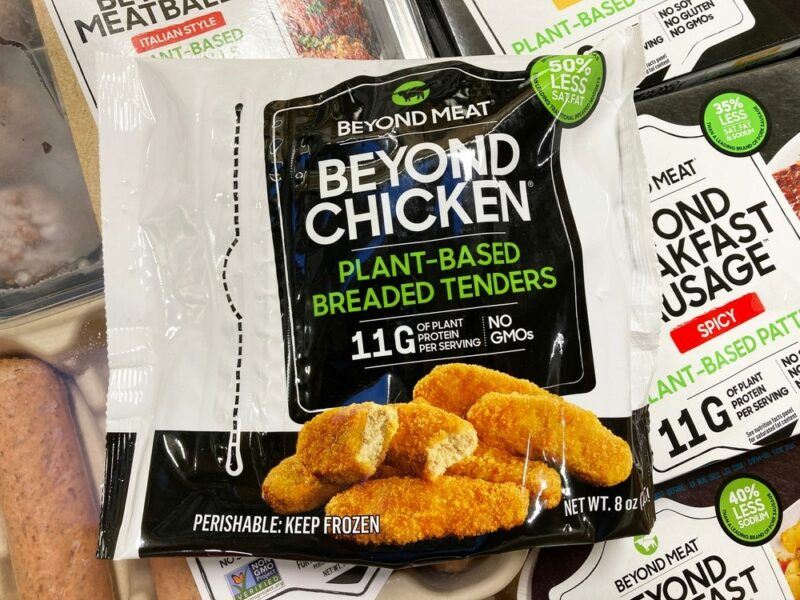
While plant-based chicken sounds good at first glance, there are some serious underlying issues.
Highly Processed
The biggest problem with plant-based chicken is the processing. Most products go through an incredible amount of processing. How else do you get wheat, soy, or peas to look and taste much like chicken?
While processing helps to give you tasty and convenient foods, it’s rarely ever a healthy approach. The processing steps can all decrease the nutrient and antioxidant content of your foods, giving you an inferior product.
Processed foods also contain a wide array of ingredients. Many of these are natural and may be beneficial, while others are much more controversial.
The additives in processed foods are always concerning, as you never really know how they influence your health. Companies don’t even need to prove that their products are safe, as long as the product fits within established guidelines.
Here’s the thing.
If you want to improve your health by eating more plant-based foods, are ultra-processed products really the way to go? Wouldn’t it be much better to focus on real food?
The Sodium Content
Like most processed foods, plant-based chicken is often high in sodium. You might be getting 400 mg of sodium or more in a single serving.
To put that in context, current recommendations suggest we should consume no more than 2,300 mg of sodium per day – and ideally less than 1,500 mg. Getting 400 mg of sodium in a serving of chicken is a decent chunk of that 1,500 mg target.
Remember that you’re getting sodium from plenty of other places too.
In fact, sodium intake is a severe issue in the United States. Many of us go far over the recommended intake, a pattern that can increase our blood pressure, raise heart disease risk, and lead to fluid retention.
The Nutrient Profile Often Isn’t That Great

Despite relying on plants, plant-based chicken isn’t amazing nutritionally. The products are often surprisingly high in fat and carbs, while containing less protein than you’d get from real chicken.
Take the Field Roast Buffalo Wings that we talked about earlier. Those ones contain 270 calories, 15 grams of fat, and 23 grams of carbs per serving. That’s a lot, especially as you’re only getting 11 grams of protein.
You’re also getting less of some of the key nutrients found in chicken, including vitamin B12, zinc, and iron.
Often Uses Natural Flavors
Most plant-based chicken brands avoid artificial flavors and sweeteners. This isn’t surprising, as such additives are highly controversial.
Natural flavors sound much healthier. Unfortunately, though, this isn’t necessarily the case.
As the names suggest, artificial flavors are created in a lab, while natural flavors come from nature instead. But, the term natural flavor just means ‘derived from nature’. There’s often been a decent amount of processing – to the extent that natural and artificial flavors really aren’t that different at all.
The Carb Content
Plant-based chicken often relies on legumes or grains. As such, it tends to be much higher in carbs than regular chicken. You’ll often get at least 10 grams of carbs per serving and sometimes 20 grams or even more.
Most products don’t contain much fiber, so most of the carbs are digestible. This is a stark contrast to chicken, which is free from carbs and a common keto ingredient.
The carb content may be a serious issue. High carb diets are thought to increase inflammation, raise the risk of type 2 diabetes, lead to blood sugar fluctuations, and promote weight gain. Who needs that?
Carbs may still be helpful when they come from whole food sources, but that’s not really the case with plant-based chicken. After all, we’re talking about a highly processed product. It’s never going to have all the same benefits as using whole grains and legumes directly.
The Benefits Of Plant-Based Chicken Haven’t Been Proven
Research often suggests that plant-heavy diets are powerful for health. Eating this way may decrease inflammation, reduce the risk of heart disease, help you lose weight, and keep your body functioning well.
You’re also getting plenty of nutrients and antioxidants from the plants, including many compounds that you don’t get from animal foods. A plant-based diet could even help you live longer. How amazing is that?
However, most of that research focuses on people who include fruits, vegetables, legumes, and whole grains in their meals. It’s not clear whether processed plant-based foods have the same effect.
We already know that relying on ultra-processed foods isn’t great for health. Plant-based chicken isn’t likely to be better just because it’s made from plants.
Often Relies On Wheat Or Soy

Wheat and soy are popular ingredients in plant-based chicken, partly because they’re inexpensive. This can be an issue, as both are controversial.
Let’s start with wheat.
The biggest issue here is the gluten content. Gluten gives many people notable side effects, including bloating, fatigue, diarrhea, or stomach cramps. There’s even the chance that consuming gluten when you’re sensitive to it increases your risk of depression and causes significant harm to your body.
Thankfully, plenty of people aren’t sensitive to gluten at all and can eat wheat-containing products without a problem.
There are many areas of controversy with soy, including phytoestrogens, antinutrients, and the potential for genetic modification. There isn’t strong evidence for any of these risks. In fact, most experts say that the benefits of soy far outweigh any problems.
Still, while the risks of soy and gluten are minor for most people, these risks do exist. Such risks are often a reason to avoid soy and/or wheat products as much as possible. After all, there are plenty of less controversial ingredients to choose from.
Is Plant-Based Chicken Healthier Than Real Chicken?
Chicken is a nutritious ingredient that’s high in protein, offers plenty of nutrients, and is low in fat. It isn’t subject to all the same controversies as red meat either and shouldn’t increase your risk of cancer.
On the other hand, plant-based chicken is often highly processed, relies on many additives, and isn’t nearly as good for you as the plants that it uses as ingredients. In most cases, then, real chicken may easily be the healthier choice.
But, the balance of benefits and risks changes when we talk about products like chicken nuggets. Real chicken nuggets aren’t just heavily processed, they’re often high in fat too, and mightn’t even contain that much chicken. Plus, as a type of processed meat, they might increase your cancer risk.
Plant-based chicken nuggets don’t raise cancer risk in the same way. They’re often less processed than regular chicken nuggets, rely on more whole food ingredients, and are lower in fat.
So, if you love chicken nuggets, the plant-based ones tend to be a much better choice.
Less Processed Alternatives You Can Try
Most of the issues with plant-based chicken relate to the processing and additives.
One way around the problem is to make vegan chicken yourself. Doing this helps you avoid additives and give you full control of the finished product. There are plenty of versions to try too.
For example, this recipe relies on chickpeas, vital wheat gluten, nutritional yeast, and various flavoring ingredients. This one focuses on cashews, tofu, and soy yogurt instead.
Or, why not skip the idea of closely mimicking the taste and texture of chicken? Instead, look for ingredients that you can use in roughly the same way.
Jackfruit is a popular choice. The flesh of jackfruit has a surprisingly similar texture to meat and easily takes on the flavor of whatever sauce you include with it. You can actually use it in much the same way as pulled chicken.
Cauliflower works well too, as an alternative to chicken wings. You can easily make vegan cauliflower buffalo wings by using an air fryer or an oven and some creative seasonings.
Jackfruit and cauliflower are both lower in protein than processed plant-based chicken products. Still, you can easily get protein in other parts of your meal.
Final Thoughts
The biggest advantage of plant-based chicken is that it isn’t chicken. It doesn’t harm animals at all and causes less damage to the environment. It’s also a good choice for anyone trying to avoid animal protein.
Still… there are some serious problems, starting with how highly processed the products are. Let’s be realistic here, plant-based or not, highly processed foods are never wise for health. It’s much better to rely on plant-based ingredients themselves.
Besides, chicken isn’t controversial to the same degree as red meat, sausages, and bacon. Instead, it’s an excellent source of lean protein and has been associated with many benefits.
These patterns don’t mean that you need to avoid plant-based chicken, but it is worth moderating your intake. Perhaps you only turn to plant-based chicken when you’re really short on time and energy and use less processed sources of protein at other times.
Frequently Asked Questions
What Is Plant-Based Chicken Made Out Of?
Brands vary in the ingredients they use. Soy is a common ingredient, often in the form of soy protein isolate or tofu. Some products use another type of vegetable protein, either instead of soy or in addition. You’ll often see wheat flour as well or another wheat-based ingredient as well.
Along with these base ingredients, there’s a variety of seasoning ingredients, additives, fillers, and the like. These all help to give the product a chicken-like flavor and texture. In general, the more additives and processing, the closer the product is to true chicken.
Is Plant-Based Chicken Vegan?
While the term plant-based chicken implies the product is vegan friendly, this isn’t always the case. Some plant-based products still use some animal-based ingredients, like whey powder or occasionally eggs.
Thankfully, many plant-based chicken companies have vegan values, so they exclude all concerning ingredients. If you’re worried about this, research the companies you’re considering or look for a vegan label on products.
Is Plant-Based Chicken Better For The Environment?
Research suggests that plant-based products tend to be more environmentally friendly. However, the difference isn’t as dramatic as you might expect, partly because plant-based products are heavily processed (much more so than regular chicken).
Is Plant-Based Chicken Keto Friendly?
Plant-based chicken normally focuses on being as similar to chicken as possible, which often involves using some high carb ingredients. Because of this, such products mightn’t be keto friendly. There are some exceptions, but you’ll need to dig around to find them.
Does Plant-Based Chicken Reduce Inflammation?
Research shows that plant-based diets decrease inflammation and promote health in a variety of ways. However, most of that research focuses on eating whole plant-based foods like fruits, veggies, and legumes.
Whether that effect happens with processed plant-based products like plant-based chicken is much more debatable. After all, processed food is often linked to increased inflammation instead.
If you’re trying to lower your inflammation, it’s much better to focus on unprocessed plant-based ingredients and prepare them yourself.

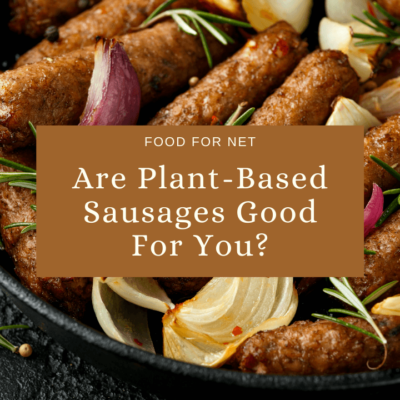

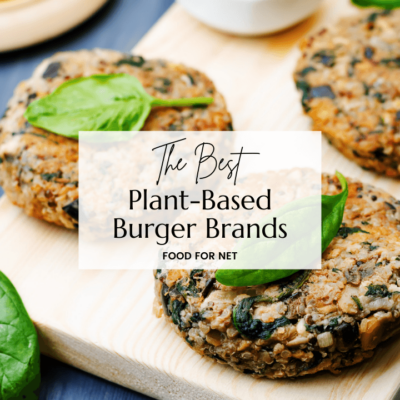
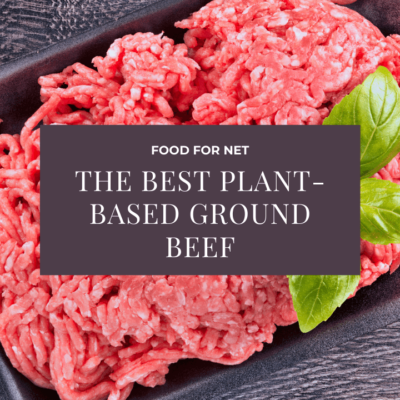

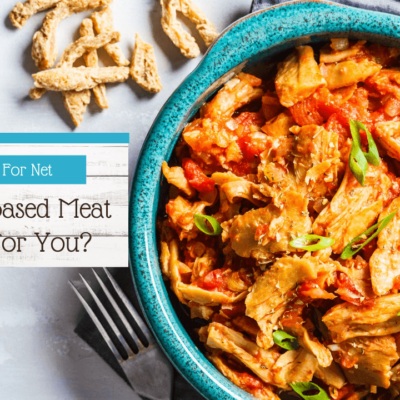
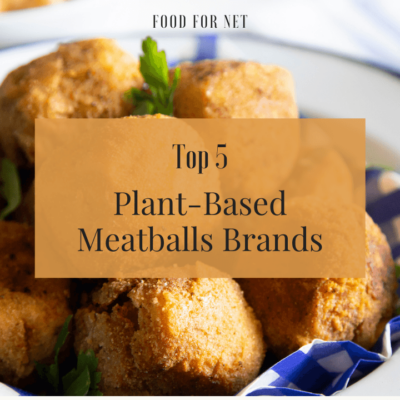

 Is Loaded Tea Good For You?
Is Loaded Tea Good For You?
Leave a Reply